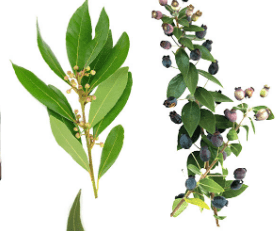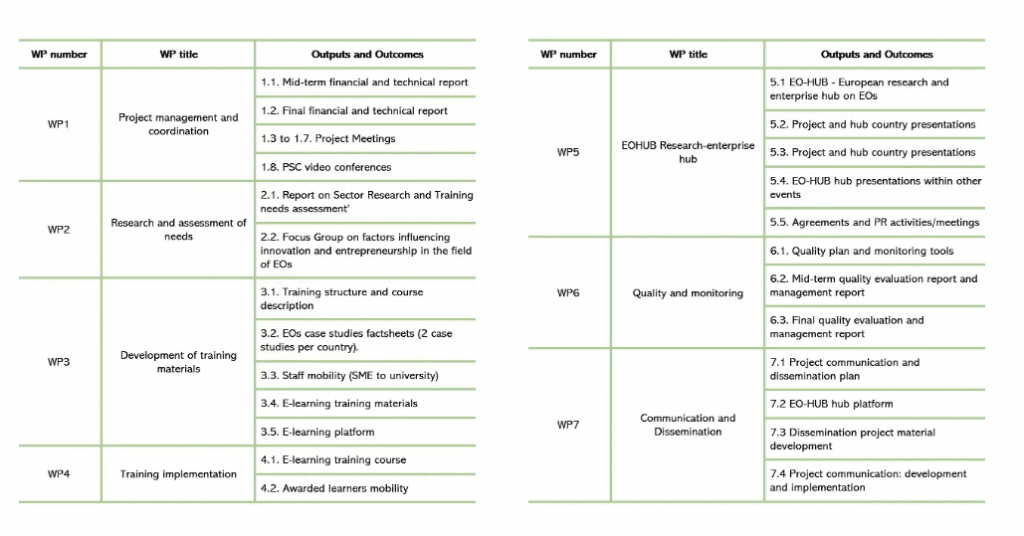
AIM OF THE PROJECT
EOHUB will contribute to achieve smart, sustainable and inclusive growth, through stimulating entrepreneurship and innovation in the field of EOs, fitting within the EU 2020 strategy.
EOHUB will contribute to achieve smart, sustainable and inclusive growth, through stimulating entrepreneurship and innovation in the field of EOs, fitting within the EU 2020 strategy. It does so by providing a strong partnership between higher education institutions, their research departments, and business, making the knowledge triangle work in a relative new sector with increasing opportunities for research, innovation and economic growth. EOHUB aims to increase the capacity of higher education institutions and business to integrate research results and innovative practice into the educational offer, and to exploit the potential for marketable process, methods and services in the field of BAEOs. Moreover, it helps graduates and PhD students to develop new entrepreneurship activities and marketable services in line with their curricula, which too often remain only at the level of “theoretical applications” and “case studies”.
The project responds to changing needs of the modern economy, anticipating new careers in line with the global challenges and issues of climate change, ecosystem services and biodiversity degradation.
EOHUB will create a supporting EU hub linked with associations of economic sectors (forest owner´s associations, Associations for Medicinal and Aromatic Plants, European Herb Growers Association, International Society for Horticultural Sciences, International Trade Association, etc.), and with association of research institutions strictly linked with the project topic to increase the EU governance and to ensure funding after the project time-life.

GENERAL INTRODUCTION
Plants produce secondary metabolites, such as essential oils (EOs). According to CBI, the demand for EOs is going to grow. EOs are employed in food & beverage, cosmetics & toiletries, aromatherapy, home and health care, and others. EOs are the main ingredient in some pest – control products and some over – the – counter medications. They’re used in the food industry because of their preservative potency against food – borne pathogens thanks to their antimicrobial, antibacterial, and antifungal properties. Increasing consumer disposable incomes and rapid expansion of food & beverage industries are expected to contribute to the demand for natural fragrances & flavors produced using EOs.
The added health benefits of EOs are expected to trigger their demand in pharmaceutical applications as well. Rising demand for aromatic cleaning agents and bio-based personal care products is expected to stimulate demand for home care and personal care products. The increased use of fragrances and flavors owing to the expansion of end-use industries in emerging markets. Most of the exotic EOs are produced from rare crops and plants which are either difficult to harvest or are a very species in nature. Restrictions on harvesting and cultivation of such trees & plants will probably add to the raw material scarcity.
produced from rare crops and plants which are either difficult to harvest or are a very species in nature. Restrictions on harvesting and cultivation of such trees & plants will probably add to the raw material scarcity.


EOs field contribute to smart growth by promoting the development of an economy based on knowledge and innovation. It promotes sustainable growth through: a more resource efficient, greener and more
competitive economy and inclusive growth by high-employment economy delivering
social and territorial cohesion. In order to combating poverty, creating more
and better employment opportunities in rural areas is
essential to reduce poverty, eradicate hunger and improve food security,
especially with respect to employment in agriculture, livestock, forestry,
fisheries, and natural resources management, particularly youth, women and migrant workers in rural areas.
Currently, in European countries, the main problem is the considerable decentralization of this market, which is characterized by lack of information and data in the sector, together with a deficiency regarding quality requirements of crops and products obtained from them, method of production and cultivation, market demand and how to access to it. Besides, the demand for new products asks for advances in the EOs sector.
The main challenges to be channeled will be the growing demand, new markets, leadership potential at European and World level, and bio-economy integration. For enterprises (SME), this field is a niche for market, business and entrepreneurship, demanding the knowledge and tools required for a quality product and the necessary skills for its start-up, connecting/integrating technology/innovation in the field of EOs. In this context, universities (HE) have the means for technology and knowledge
transfer.

ANALYSIS OF THE SUBJECT AREA
1
Lack of recognized skill competencies and career ladders, as well as sources of training.
2
Additionally, HE needs to be updated to meet the skill requirements identified by the emerging EOs industry. .
3
Few educational programs address the need for laboratory science workers; a low enrolment in existing programs; and a large number of current students lack the hands-on laboratory skills needed for employment.
4
Gap between the readiness of students entering community colleges and the demands of bioscience coursework as evidenced by the high number of entering students who need remedial math and science coursework.
5
Image and Outreach to the Public: students, educators, and job seekers lack clear information about career options within the EOs industry, therefore limiting the number of individuals attracted to the industry.
Currently, in European countries, the main problem is the considerable decentralization of this market, which is characterized by lack of information and data in the sector, together with a deficiency regarding quality requirements of crops and products obtained from them, method of production and cultivation, market demand and how to access to it. Besides, the demand for new products asks for advances in the EOs sector.
The main challenges to be channeled will be the growing demand, new markets, leadership potential at European and World level, and bio-economy integration. For enterprises (SME), this field is a niche for market, business and entrepreneurship, demanding the knowledge and tools required for a quality product and the necessary skills for its start-up, connecting/integrating technology/innovation in the field of EOs. In this context, universities (HE) have the means for technology and knowledge transfer.

EOHUB will bring together technological companies, HEIs and research organizations in order to provide a training and support path for young scientists toward entrepreneurship, innovation and conservation in the field of EOs. It will merge scientific knowledge on EOs, practical examples and case studies of successful companies providing services within EOs, business models/case studies of business that trade and value natural products, connecting bio-applications of EOs, involving research centres and companies. The main challenges will be the growing demand, new markets, new bio-applications, biodiversity preservation and bio-economy integration.

EUROPEAN VALUE
Benefits of European cooperation: EU 2020 strategy is focused on a smart, sustainable and inclusive growth, where higher education is playing an essential rule in providing skilled human capital in knowledge-intensive jobs, reinforcing Europe’s capacity to benefit from globalisation. Market demand for transversal competences, creativity and flexibility, is significantly growing, especially in the field of Nature-based economy. In this sense EOHUB is moving toward new and innovative training approaches, aiming at the creation of a solid network between high-education institutions, businesses, start- up and supporting services in the field of Medicinal and Aromatic plants (EOs).
The benefits of EU cooperation are related with the possibility of experimenting and testing different entrepreneurship and innovation methods, processes, services within a variety of policy and socio-economical context at EU level. Policies, legislation and market mechanisms differs country by country, therefore research and business cooperation will have to bring the value added of coherent and harmonizing solutions, helping EU to respond to ecosystem services and biodiversity degradation.
Need for European cooperation: Each business partner has been selected for representing a different business model and for being specialized on a specific EOs topic. Universities have been selected because of previous projects outputs and for the type of EOs research and education activities. Therefore, partnerships will allow high quality training and network ensuring a more diversified and attractive portfolio of learning experiences. An EU wide training will allow responding to the demand for a unified market, where researchers and students collaborates and work together at EU level. The cooperation is needed in order to build the EOHUB hub.The added health benefits of EOs are expected to trigger their demand in pharmaceutical applications as well. Rising demand for aromatic cleaning agents and bio-based personal care products is expected to stimulate demand for home care and personal care products. The increased use of fragrances and flavors owing to the expansion of end-use industries in emerging markets. Most of the exotic EOs are produced from rare crops and plants which are either difficult to harvest or are a very species in nature. Restrictions on harvesting and cultivation of such trees & plants will probably add to the raw material scarcity.
EOs field contribute to smart growth by promoting the development of an economy based on knowledge and innovation. It promotes sustainable growth through: a more resource efficient, greener and more competitive economy and inclusive growth by high-employment economy delivering social and territorial cohesion. In order to combating poverty, creating more and better employment opportunities in rural areas is essential to reduce poverty, eradicate hunger and improve food security, especially with respect to employment in agriculture, livestock, forestry, fisheries, and natural resources management, particularly youth, women and migrant workers in rural areas.
Why results cannot be achieved at national level?
Climate change, ecosystems and biodiversity degradation are global and European scale phenomena. Yet, education and markets, innovation and entrepreneurship need to work at European level in order to respond to 2020 political agenda on higher education. The concept of knowledge transfer within EOHUB is not only applied to business- university partnerships at country level but also between business-to-business and universities-to-university at EU level. The relative innovative character of the topic, with few consolidated business and policy initiatives that work on the subject of the proposal, has required an EU partnership for increasing multiplier effects and applicability of results.
Advances in EOs, especially in bio-applications associated sector promise to be one of the major leaps in human scientific understanding in the twenty-first century, offering new products and processes that may help to address some of the world’s most pressing challenges. The agri-food sector is one area where EOs bio-applications could deliver on this promise. Innovative research is aimed at ensuring that Europe can fully benefit from the opportunities created through agri-food bio-applications solutions, whilst maintaining high levels of environmental, food and consumer safety. Innovation within the EU food and agriculture system is needed to increase productivity growth and sustainability.

PARTNERSHIP-PROJECT
MANAGEMENT
The consortium is composed of 9 partners, 4 universities (HEIs), 1 research center and 4 SMEs from 4 countries (Spain, Hungary, Belgium and UK). Activities will be implemented under the leadership and active decision-making of UPM (P1) that will ensure coherence, smooth exchange of information, synergies creation, and positive collaboration among all partners. UPM has a long experience of project management and coordination of several EU funded projects. An equal distribution of tasks and budget among partners and countries will ensure a strong commitment from all parties, increasing the efficient use of resources, and ensuring the delivery of all Work Packages in a timely manner.
WORK PLAN AND WORK PACKAGES

